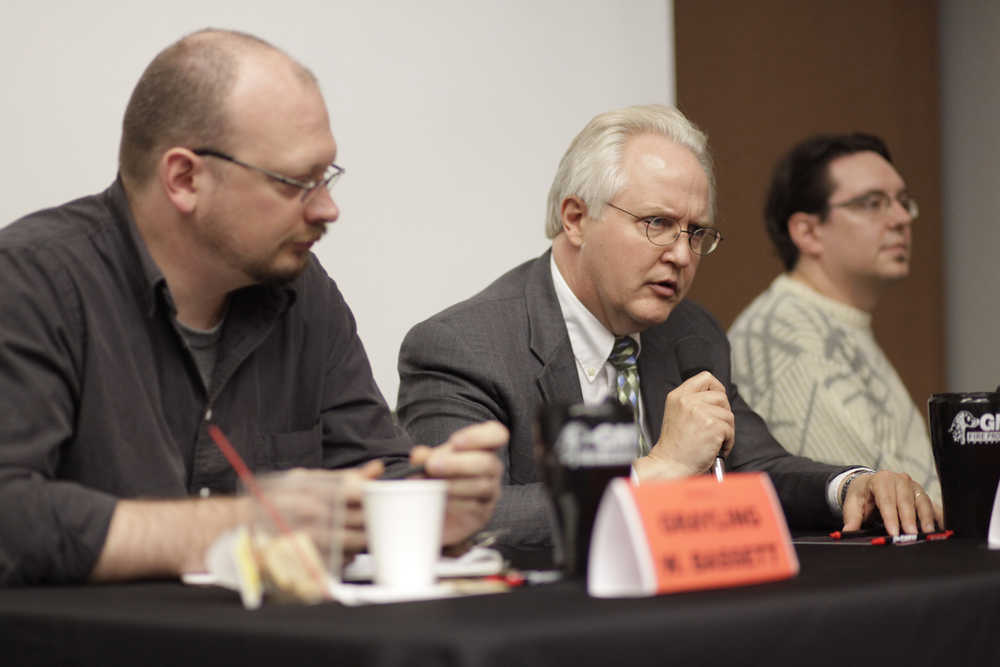With the Kenai Peninsula Borough Assembly District 2 seat up for grabs, candidates Grayling Bassett, Blaine Gilman and Jake Thompson made their case for the position at the Kenai Visitor and Cultural Center, Wednesday.
The candidates are vying for the seat currently held by Hal Smalley, who will be term-limited out. The municipal election is Oct. 7.
In their opening statements, Bassett, Gilman and Thompson iterated their close ties with the central Kenai Peninsula.
Gilman, a local attorney, said raising his four children with his wife, Margaret Gilman, in Kenai, is responsible for what he hopes to accomplish through the Kenai assembly seat if elected. He emphasized his belief that developing stronger family units in the area will in turn build a stronger community.
Thompson, who works for KSRM Radio Group as program director, also said his family has given him a sense of responsibility to create a better future for his two children and increased his desire to run of public office. He said he hopes he can assist in the borough’s fiscal responsibilities.
Bassett said his experience working within the local economy that includes the commercial fishing and oil and gas industries contributed to his specific political concerns over erosion abatement and “finding cost-effective solutions to local problems.”
The first issue the candidates addressed was the viability of the current operating policy at Central Peninsula Hospital. Gilman said the current policy “needs to be tweaked.” Refusing to enter a transfer agreement with the Surgery Center of Kenai is minimizing the potential for other competition within the Kenai community, he said. Health care in the area needs a place for private sector competition, he said.
Thompson said the current CPH policy is creating a monopoly. The hospital is operating more as a business concerned with profits and expenditures and less as a community hospital. Competition means better services and lower costs, he said.
Bassett said he was unclear of the intricacies of the situation, but that there seemed to be misunderstandings among the public that should be cleared up.
The candidates were asked for their responses to Proposition A, concerning borough animal control, and Proposition B, vote-by-mail elections. Both are advisory votes.
Gilman said he doesn’t feel bound to the outcomes of the advisory votes on the two propositions. Advisory votes exist because assembly members don’t want to make hard decisions, he said.
“That’s why you are elected — to make hard decisions,” Gilman said.
Bassett said he feels his opinion is not relevant on the issue of animal control, because he doesn’t live in the affected area. He said vote-by-mail elections would be helpful for residents who work out of town and it would be a positive addition to the system already in place.
Thompson said he is against both propositions, saying the Alaska State Troopers handle animal abuse cases and the borough doesn’t need to spend government dollars. The additional expense of sending out ballots for vote-by-mail elections was unnecessary.
“I like my sticker and candy when I vote,” Thompson said.
The candidates were also asked to address long-term issues such as environmental protection and how the borough should be spending taxpayer money, specifically on non-departmental agencies.
They were asked whether they support or oppose funding of non-departmental organizations. Gilman said the borough’s decisions on how to spend money should be limited to road maintenance, garbage and education.
Thompson said funding organizations such as the Central Area Rural Transit System, which helps people get around the area is beneficial.
Thompson said the issue was the taxpayer’s decision.
In response to the contention between property rights and stream protection resulting from the anadromous stream protection ordinance, Thompson said there needs to be a revision that is more favorable to the property owners, but still protects the environment.
Gilman said the Kenai and Kasilof Rivers need protection, but there is need for industry development that will create more jobs and he is concerned about the layers of regulations — borough, state and federal — discouraging development.
Bassett said coming to an agreement would be a challenge on dealing with issues of private properties and communal resources.
“I don’t like having canned solutions to solve problems that might come up,” Bassett. “The best way to get around that is to have community dialogue and accountability for representatives, with large investments coming up we need to think about what kind of community do we want to have and quality of like we want to keep.
Kelly Sullivan can be reached at kelly.sullivan@peninsulaclarion.com.


